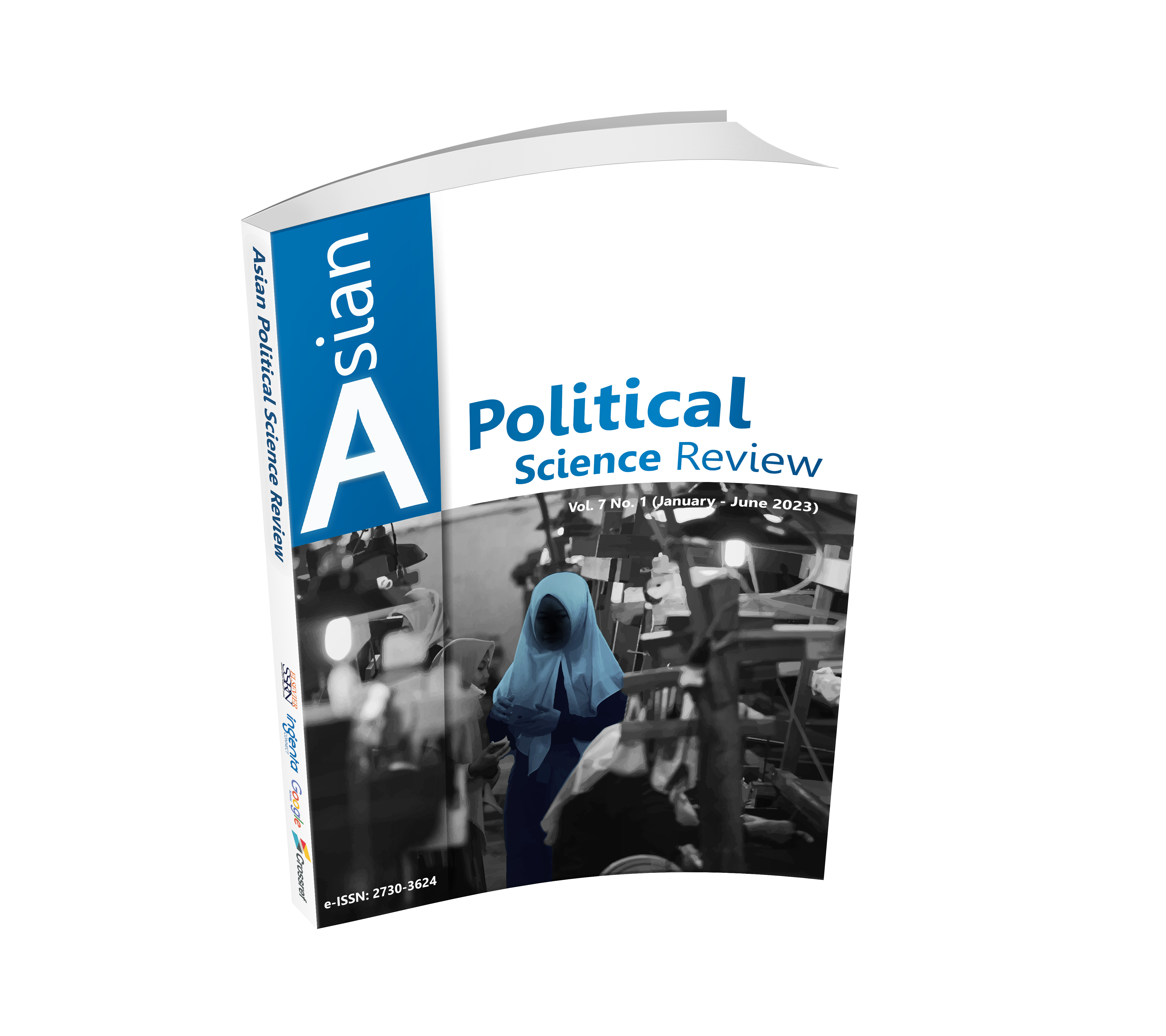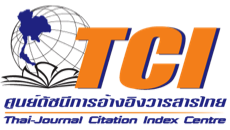THAILAND’S SMART AGRICULTURE AND ITS IMPACTS ON THAI FARMERS: A CASE STUDY OF SMART AGRICULTURE IN AYUTTHAYA, THAILAND
DOI:
https://doi.org/10.14456/apsr.2023.1Keywords:
Smart Agriculture, Agriculture, Thai FarmerAbstract
Smart agriculture driven by technologies is one of the agriculture strategies under the 20-year Thailand’s national strategy, laid out in 2018, on competitive enhancement strategy which has been developed to achieve value-added agriculture and improve Thai agriculture to meet the global demand and to achieve the Sustainable Development Goals of the United Nations. This study examines Thai agricultural sector’s problems by using agriculture sector in Ayutthaya Province as a case study. The study also examines the implementation of the smart agriculture in Ayutthaya Province by focusing on its advantages and disadvantages and offers appropriate solutions for greater development. The data were collected using semi-structure interviews with 18 key informants who have relevant experience in the area of agriculture and smart agriculture technologies. The results of the interviews illustrated the current situation of the agricultural sector such as the problems of irrigation system management, high production cost, and a decline in the agricultural commodity prices. The results also indicated advantages and disadvantages of the smart agriculture used to develop Thai agricultural sector. The smart agriculture can help reduce the production costs, increase productivity in terms of quantity and quality, and help reduce the use of labor. However, some groups of farmers, especially the elderly, deny using the smart agriculture as it is costly, and they do not have sufficient background knowledge about technologies
Downloads
References
Attavanich, W., Chantarat, S., Chenphuengpawn, J., Mahasuweerachai, P., & Thampanishvong, K. (2019). Farm, Farmers and Farming: A Perspective through Data and Behavioral Insights. Bangkok: Puey Ungphakorn Institute for Economic Research.
Chu-ongsakul, O. (2020). Challenges and Opportunities of Smart Farming Implementation. Master of Management Thesis, Mahidol University.
Daxue Consulting. (2022). Agricultural tech in China: Feeding 20% of the world’s population with 7% of its arable land. Retrieved from https://daxueconsulting.com/agricultural-technology-china/?fbclid=IwAR3s3dKCBU3aiM6vES3E696gNphJ8M7-gg87NbS-BDsxi-0pkQ_ae0c65Lg.
Fleming, A., Jakku, E., Lim-Camacho, L., Taylor, B., & Thorburn, P. (2018). Is big data for big farming or for everyone? Perceptions in the Australian grains industry. Agronomy for Sustainable Development, 38, 24.
Food and Agriculture Organization of the United Nations. (2021). FAO supports China-Latin America and the Caribbean partnership to boost agri-food systems. Retrieved from www.fao.org/news/story/en/item/1377572/icode/.
Food and Agriculture Organization of the United Nations. (2023). Sustainable Development Goals. Retrieved from https://www.fao.org/sustainable-development-goals/.
Juhari, H. (2021). How the Agrifood Sector can be more sustainable in meeting SDG 1 and SDG 2?. Bandar Seri Begawan: Universiti Brunei Darussalam.
Kaneda, T., Greenbaum, C., & Kline, K. (2020). 2020 World Population Data Sheet. Washington, D.C.: Population Reference Bureau.
Kendall, H., Naughton, P., Clark, B., Taylor, J., Li, Z., Zhao, C., Yang, G., Chen, J., & Frewer, L. (2017). Precision Agriculture in China: Exploring Awareness, Understanding, Attitudes and Perceptions of Agricultural Experts and End-Users in China. Advances in Animal Biosciences, 8(2), 703-707.
Kraipinit, Y., Chantuk, T., & Siriwong, P. (2017). New Agricultural Management of Thailand. VRU Research and Development Journal Science and Technology, 12(2), 115-127.
Kwanmuang, K., Pongputhinan, T., Jabri, A., & Chitchumnung, P. (2020). Small-Scale Farmers under Thailand's Smart Farming System. Retrieved from https://ap.fftc.org.tw/article/2647?fbclid=IwAR0AOqmtVLNSfWiXCUTxv6D2UkWGaiRXhUYlKERFgDreliCgcycdmCElweU.
Lehmann, R., Reiche, R., & Schiefer, G. (2012). Future internet and the agri-food sector: State-of-the-art in literature and research. Computers and Electronics in Agriculture, 89, 158-174.
Ministry of Agriculture and Cooperatives. (2022). Summary Report of the Ministry of Agriculture and Cooperatives. Retrieved from https://data.moac.go.th/?fbclid=IwAR1NT597M-3_uUe4o39XYKm8dHPwE4nogxD-gQSnLNlCvYPu2iwxUz_cNg4.
Musa, S., Basir, K., & Luah, E. (2022). The Role of Smart Farming in Sustainable Development. International Journal of Asian Business and Information Management, 13(2), 1-12.
National Science and Technology Development Agency. (2020). Smart Farming. Bangkok: Ministry of Higher Education, Science, Research and Innovation.
National Strategy Committee. (2018). National Strategy 2018-2037. Bangkok: Office of the National Economic and Social Development Council.
Obaisi, A. (2017). Overpopulation: A Threat to Sustainable Agriculture and Food Security in Developing Countries? A Review. International Journal of Agriculture and Food Security, 6, 921-927.
Office of the National Economic and Social Development Council. (2021). Report Summarizing the Implementation of the National Strategy for the Year 2021. Bangkok: Office of the National Economic and Social Development Council.
Phra Nakhon Si Ayutthaya Provincial Agriculture and Cooperatives Office. (2022). Report on the Results of Farming in Ayutthaya Province. Phra Nakhon Si Ayutthaya: Phra Nakhon Si Ayutthaya Provincial Agriculture and Cooperatives Office.
Reuters. (2022). Thailand targets higher rice exports of 7.5 mln tonnes this year. Retrieved from www.reuters.com/markets/asia/thailand-targets-higher-rice-exports-75-mln-tonnes-this-year-2022-09-08/.
Singhapreecha, C. (2014). Economy and Agriculture in Thailand. Retrieved from https://ap.fftc.org.tw/article/682.
Srivetbodee, S., & Igel, B. (2021). Digital Technology Adoption in Agriculture: Success Factors, Obstacles and Impact on Corporate Social Responsibility Performance in Thailand’s Smart Farming Projects. Thammasat Review, 24(2), 149-170.
Thairath. (2018). Budget of 2019, which is more than 200 billion Baht, MOAC dreams big and throws money to build "Smart Farmer". Retrieved from www.thairath.co.th/money/economics/thailand_econ/1203958.
United Nations. (2013). World must sustainably produce 70 per cent more food by mid-century - UN report. Retrieved from https://news.un.org/en/story/2013/12/456912.
Wolfert, S., Ge, L., Verdouw, C., & Bogaard, M. (2017). Big Data in Smart Farming - A review. Agricultural Systems, 153, 69-80.
World Bank. (2022). Thailand Rural Income Diagnostic: Challenges and Opportunities for Rural Farmers. Retrieved from www.worldbank.org/en/country/thailand/publication/thailand-rural-income-diagnostic-challenges-and-opportunities-for-rural-farmers.

Downloads
Published
How to Cite
Issue
Section
License
Copyright (c) 2023 Authors

This work is licensed under a Creative Commons Attribution-NonCommercial-NoDerivatives 4.0 International License.











.png)


